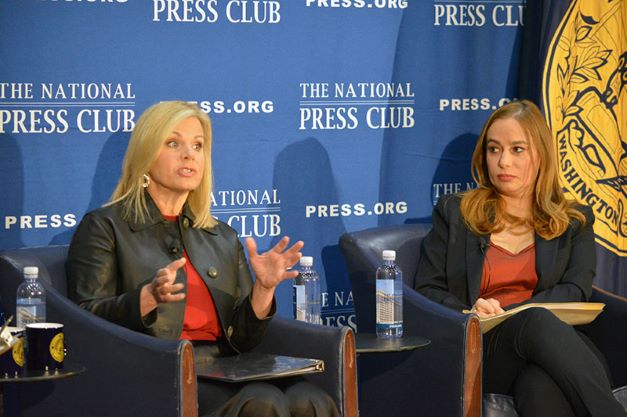Carlson, Roginsky talk about their efforts to push anti-sexual harassment bill
Two former Fox News personalities told a National Press Club Headliners Newsmaker that they had to tap deep wells of courage when fighting sexual harassment at the network.
Gretchen Carlson, now with People TV, said bringing sexual assault charges against Fox Chairman and CEO Roger Ailes in July 2016 was like “jumping off a cliff.”
Carlson risked not only her job and her career, but her reputation. She said she found the strength to face “the most powerful man in media” by drawing on the values of hard work and honesty that her midwestern parents had taught her, Carlson told the audience at the March 29 event.

She recounted what she said were frightening, personal moments when she found herself alone with male co-workers who abused their power and tried to take advantage of her.
Carlson said she never expected that her charges would not only be heard, believed and vindicated in a personal lawsuit against Ailes but that they ultimately would lead to the national #MeToo movement that has inspired hundreds of women to speak up about their own experiences with sexual harassment.
Carlson appeared at the Newsmaker with Julie Roginsky, a Democratic political consultant and TV personality who worked at Fox as a co-host on “The Five” and “Outnumbered” programs.
Both Carlson and Roginsky filed sexual harassment and retaliation suits against Fox News and Ailes. They ultimately settled their lawsuits, and Ailes resigned under fire. Ailes died in 2017.
Ending forced arbitration
They discussed how they convinced Congress to pass the “Me Too” bill that prevents companies from forcing sexual harassment and assault claims into arbitration.
Roginsky agreed with Carlson that she had to draw on seemingly fathomless courage. Referring to Russia’s war in Ukraine, Roginsky said that she and her family fled Russia when she was 6. Courage is necessary for those who stand up for what is right, she said.
Many companies force sexual assault and harassment claims into arbitration. The new law ended that practice.
Nearly all -- 98% -- of sexual assault cases are settled through arbitration, and of the 2% that do make it into court, the employee wins only about 2.5% of the time, Carlson said.
“Arbitration was meant for small business disputes, to unclog the courts, never for human rights,” Carlson said. “It is a secret process where the deck is stacked against the worker. Companies pick the arbitrator, which is mostly a retired judge or lawyer, i.e. older white men. There is no appeals process, and in the end, the perpetrator gets to stay on the job, and so, the vicious cycle continues. There is no rule of law.”
The issue reaches far beyond sexual harassment to other issues in toxic workplaces, Carlson said, that affect not just to women, but also to African Americans and other minorities, the disabled, older employees, and the LGBTQ community.
Dangers of NDAs
Carlson and Roginsky are now working to educate workers about the drawbacks of non-disclosure agreements through the Lift Our Voices nonprofit organization.
In sexual assault and harassment cases, Roginsky said, NDAs can preclude a victim from discussing an ordeal not only with a member of the clergy, a psychologist or other medical professional, or even a co-worker.
Journalists, and workers in other fields as well, need to carefully read any employment contract to ensure that it does not include clauses for forced arbitration or NDAs, Roginsky said.
Those legal strictures should not prevent victims of sexual or other forms of workplace harassment from seeking help and commiserating with people who can help them emotionally and professionally, Roginsky said.
“We are working with survivors to hear their stories every day,” Roginsky said.
